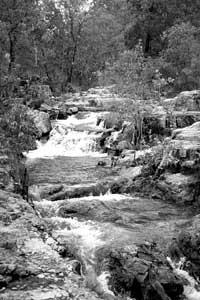Collaboration between salmon and trees

Salmon receive marine nutrients and transport them upstream to spawn. Their dead bodies fertilize the vegetation by the river. According to isotopic analyses, in the streams where laying occurs, trees and shrubs collect 22 to 24% of the nitrogen from salmon leaves. Thanks to these nutrients, the growth rate of the surrounding trees increases considerably.
At the same time, riverside vegetation improves the quality of the river's habitat thanks to shade, sedimentation, food filtering and accumulated wood piles. This favors the proliferation of salmon. Therefore, the laying not only serves to improve the production of riparian, but generates a feedback mechanism, since the nutrients contained in the salmon improve the setting and breeding area for the salmon of the following generations.
The research carried out by Robert Naiman, who works at the University of Washington, has developed in Alaska and, in his opinion, the interaction between the two requires joint management, since anything that affects salmon will affect plants and vice versa. As an example, he mentions overfishing and pollution in his work.





